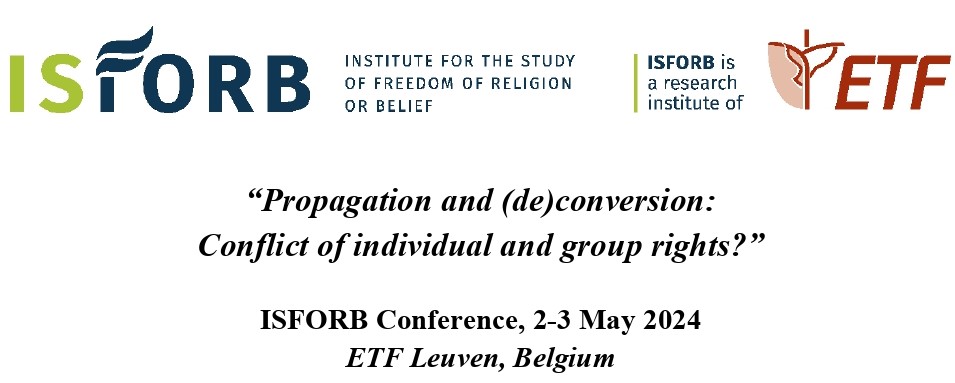
The International Institute for Religious Freedom extends the invitation of the Institute for the Study of Freedom of Religion or Belief (ISFORB) to participate in the Fourth International Conference ISFORB, on the main topic “Propagation and (de)conversion: Conflict of individual and group rights?” to be held on 2–3 May 2024 at the ETF Leuven, Belgium.
The right to freedom of thought, conscience and religion is a fundamental human right that protects the individual’s freedom to not only have a personal worldview, but to also share their convictions with others, either in a challenging or inviting way. Such propagation can lead to a change of beliefs, commonly known as conversion or, in the case of a move to atheism, deconversion. In some contexts, however, (non-)religious propagation is considered an undesirable intrusion into people’s personal spheres. Also, some (ethno-)religious communities consider conversion from their worldview inadmissible and not a right intrinsic to FORB. In addition, for some communities, hegemonic (non-)religious discourses are considered life-threatening for their minority group identities.
The twin rights to (non-)religious propagation and to (de)conversion are the most sensitive aspects of FORB. They exemplify a vivid instance of the tension between individual and group rights in human rights discourses. This fourth international conference, organized by the Institute for the Study of Freedom of Religion or Belief (ISFORB), focuses on this topic.
Particular attention goes to members of minority worldviews and their rights and experiences. Main speakers will be, among others, Prof. Nella van den Brandt (Coventry University) and Prof. Maurits Berger (Leiden University).
This multi-disciplinary Call for Papers warmly welcomes you to our conversations, giving attention to these themes at the local, national or European level. Contributions can come from a legal, sociological, historical, theological, or other disciplinary viewpoint. Attention can go to theoretical considerations and to practical implications, related to topics such as:
- different understandings of propagation and (de)conversion in human rights and (non-)religious paradigms;
- local or regional legal provisions and religious practices that foreground socio-cultural and historical situatedness;
- philosophical, ethical and theological considerations on conversion and mission/evangelism/proselytism/dawah.
Paper proposals on other FORB-related issues, which do not focus on the particular topics of propagation and conversion, can be accepted as well.
Please send your abstract (200–300 words) for a 20min paper to isforb@etf.edu before 1 February 2024. You will be notified of acceptance before 15 February 2024.
We aim to bring quality papers of the conference together in an appropriate academic publication afterwards.